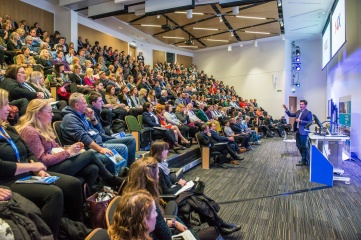Hosted by sports broadcaster, Eilidh Barbour, and held at Glasgow’s Technology & Innovation Centre, 42 expert speakers and a capacity audience gathered for the flagship industry conference to share best practice and discuss the challenges and opportunities facing Scotland’s events industry.
David Coletto from Abacus Data delivered a timely and thought provoking keynote speech, providing invaluable insight on understanding the future of events through the eyes of a millennial during his presentation ‘Disruption and Generational Change’; part of the opening plenary session, ‘The Changing Audience for Events’.
He gave the 300 strong audience three things to take away from his talk when thinking about millennials around events. Firstly they are a ‘do’ generation not a ‘have’ generation. They prefer experiences over owning goods. Secondly, it’s all about the experience. Millennials want a quality experience that is authentic, natural and value for money. And lastly, they want to be told a story but they want it to be authentic.
He said: “This generation is a product of their environment and they have been shaped with entirely new skill sets, opinions and values. The more you learn about millennials the more you can comprehend and appreciate the significance of the economic, political and social change happening around us.
“The needs of the millennial generation compared to those of previous generations are so different. We are often described as the experiential obsessed generation and it is this generational change that is disrupting so many markets, including the events and festivals sector. With millennials currently representing a quarter of the population in countries across the world, whether it be Scotland, the UK, American or Canada, it is a key market that represents great opportunity for the industry, so understanding the change and harnessing it to your advantage is vital if you want to succeed in attracting and retaining a millennial audience for your event.
“From my perspective, there’s never been a better time to be in the events and festivals business.”
The day’s 11 break-out sessions also provided further opportunities for the industry to delve into the latest trends and issues facing the sector, with EventImpacts, the National Culture Strategy Consultation, Event Tech, Social Media as well as Security, Stewarding and Policing among the popular topics delegates engaged in.
Following the break-out sessions, the delegates came together for the closing plenary session ‘‘Scotland’s Assets & The Perfect Stage’, with five of the industry’s leading professionals discussing the assets that are the cornerstone of the country’s event strategy - our people, our cultural identify and heritage, our natural environment, our built facilities, and our signature events - and providing their perspective on the opportunities and challenges of continuing to deliver a strong portfolio of events that maximise these key assets to ensure sustainable impact and international profile for Scotland.
Building on the success of the previous conference in 2015, the 2017 event provided the industry with a forum to learn, share knowledge and network, allowing event practitioners to remain up-to-date and ensuring Scotland maintains its reputation as a world-leader in event development and delivery.
Paul Bush OBE, VisitScotland’s Director of Events, said: “The National Events Conference has been a great opportunity for our industry to come together and review the progress we’ve made so far with our national events strategy, Scotland the Perfect Stage, as well as discuss the challenges and opportunities we’re currently facing. The level of debate and discussion that has taken place throughout the day has been truly outstanding.
“As an industry we are doing some amazing work, with a great portfolio of annual events as well as continually attracting some of the biggest events in the world from the Commonwealth Games, The Ryder Cup to the MTV Music Awards. Our work is the envy of many, however, as an industry we need to be better at articulating more clearly the wider benefits of events, especially as we face the challenges ahead.”
Immediately following the National Events Conference has been another leading events conference, Host City 2017, the world’s largest meeting of cities and sports, business and cultural events. Also taking place at Glasgow’s Technology & Innovation Centre from 28 to 29 November, attendees included 30 event owners and 20 organising committees as well as 200 delegates.
Using his opening remarks as co-chair of the conference, Paul, further addressed the challenges facing the events and festivals industry but this time on a global scale.
He said: “While it is an exciting time for the industry with all the technological advancements and the rise in social media allowing events and audiences to be more engaged, it is also a very challenging time. The current security climate, the transparency and governance around the bid process, as well doping and corruption in sport, are adversely affecting the confidence the public has in bidding for and delivering of major events. As a global industry we must be willing to tackle it head on if we are to maintain public support for major events around the world.
“This was an area of great debate by the Scottish events industry at the National Events Conference and one I’m sure will be continued by delegates over the two days at Host City 2017.”


